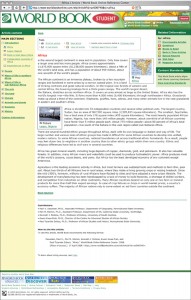Language Monday: Computers
Monday, February 19th, 2018February 19, 2018
For many people, interacting with computers is an important part of daily life. Each time you send a text message, play a video game, or search for cat pictures online—even as you read these words—you are interacting with a computer. It is through computer languages, also called programming languages, that people communicate with computers. When programmers want computers to operate in a specific way, they write detailed sets of instructions in a computer language. Like other languages, computer languages include sets of symbols organized through grammar and other rules. Unlike other languages, a computer language is not meant for direct conversation between humans. And no one—yet—has grown up speaking a computer language.

Computer programmers use detailed sets of instructions known as computer languages. Credit: © Shutterstock
In most computers, information is encoded in bits. Each bit consists of a binary digit: 1 or 0. Computer chips simulate bits with billions of tiny electronic switches called transistors. A transistor can either switch on, for 1, or off, for 0. A string of bits provides an instruction for the computer. Machine language, the most basic computer language, allows direct communication with a computer through patterns of 1’s and 0’s.
Machine language is a low-level computer language. A high-level computer language is closer to human language, and has a higher level of abstraction (separation) from computer hardware. After a programmer writes instructions in a high-level language, a program called a compiler translates them into a low-level language for a particular computer to understand. Programmers can use high-level languages to design a program for a particular job or task, rather than for a particular computer. Most programs today are written in high-level languages.

Click to view larger image
A web page is a computer file represented by a specific electronic address on the Internet. Such files can be created using a presentation language called HTML. Credit: WORLD BOOK photo
In 1945, German engineer Konrad Zuse developed the first high-level computer language, called Plankalkül (Plan Calculus), to be used with programmable electromechanic computers. Since then, many different computer languages have been developed for different purposes and for use on different kinds of machines.
Today, computer programmers use a wide variety of languages. The language HTML (HyperText Markup Language) is used to format web pages, ensuring that a website’s words and images are displayed properly to visitors. Java is the standard language for developing smartphone apps. Python, named after the British television comedy “Monty Python’s Flying Circus,” is a flexible language used for many purposes, including website development and artificial intelligence programming. C Language is used to develop operating systems.
Quantum computers, a developing technology, use quantum physics to calculate information faster than classical computers. Rather than using simple bits, a quantum computer language uses quantum bits or qubits. A qubit can store more information than just a 1 or a 0. Its value can also be somewhere in between 1 and 0. This allows the computer to perform a massive number of computations at the same time. A true quantum computer has not yet been created, but engineers around the world are racing to complete the first models. Quantum computer languages, on the other hand, have already been developed in anticipation of “speaking” with these extraordinary machines.



